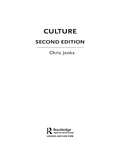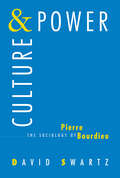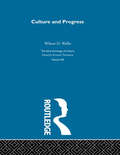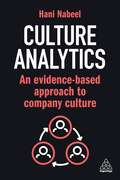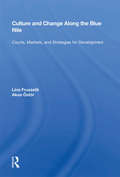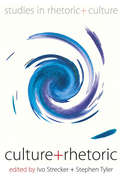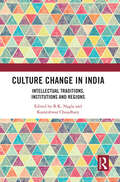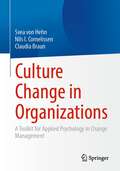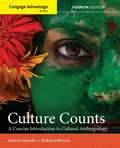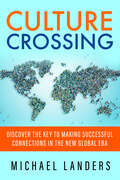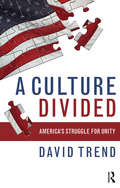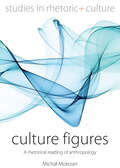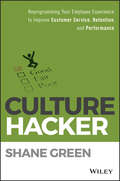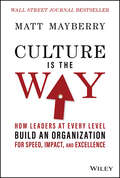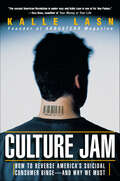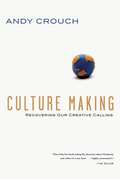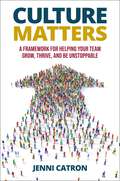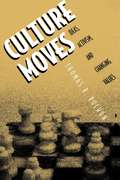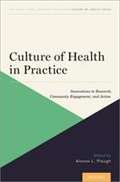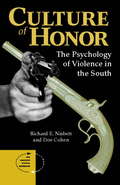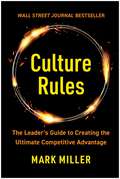- Table View
- List View
Culture
by Chris JenksCulture is a concept that has remained on the top of the agenda within the social sciences for two decades. It incites controversy and debate and always appears fresh. This book, updated throughout and with new sections on visual culture, urban culture and subcultures, argues that to understand the concept we need to locate it within traditions of thought and appreciate its political and ideological bases. The book looks at the concept of culture in the context of idealism and materialism, examining its relation to the notion of social structure and assessing its once assumed monopoly within literary study. Culture remains stimulating throughout. A standard reference text for students on sociology and cultural studies courses, this second concise and student-friendly edition offers an overview over the sociology of culture in an accessible format.
Culture
by Chris JenksFirst published in 1993. Routledge is an imprint of Taylor & Francis, an informa company.
Culture & Power: The Sociology of Pierre Bourdieu
by David SwartzPierre Bourdieu is one of the world's most important social theorists and is also one of the great empirical researchers in contemporary sociology. However, reading Bourdieu can be difficult for those not familiar with the French cultural context, and until now a comprehensive introduction to Bourdieu's oeuvre has not been available. David Swartz focuses on a central theme in Bourdieu's work—the complex relationship between culture and power—and explains that sociology for Bourdieu is a mode of political intervention. Swartz clarifies Bourdieu's difficult concepts, noting where they have been misinterpreted by critics and where they have fallen short in resolving important analytical issues. The book also shows how Bourdieu has synthesized his theory of practices and symbolic power from Durkheim, Marx, and Weber, and how his work was influenced by Sartre, Levi-Strauss, and Althusser.Culture and Power is the first book to offer both a sympathetic and critical examination of Bourdieu's work and it will be invaluable to social scientists as well as to a broader audience in the humanities.
Culture & Progress:Esc V8 (The\making Of Sociology Ser.)
by Kenneth ThompsonFirst published in 2003. Routledge is an imprint of Taylor & Francis, an informa company.
Culture Analytics: An Evidence-Based Approach to Company Culture
by Hani NabeelHow can I take a data-driven approach to company culture? What should I measure and which metrics should I focus on? How can I use people analytics and behavioural science impact culture?Based on insights from the largest ever behavioural research study which examined the organizational impact of 220+ behaviours from 60 organizations, across 61 countries, Culture Analytics provides an evidence-based approach to organizational culture. It outlines the leading and lagging culture indicators, explains how to identify actionable insights from your people and culture data as well as how to apply predictive analytics to company culture. There is also guidance on the 30 employee behaviours which have the most impact on company culture and how to apply behavioural science interventions to drive these in your organization. The second part of the book covers key areas where culture analytics can be applied to drive business performance. These areas include talent acquisition and retention, employee engagement, EDI (equity, diversity and inclusion), wellbeing, psychological safety as well as resilience, strategy, innovation, change management and risk. Full of practical advice, this book also includes real world examples from Barclays, Pfizer, American Airlines, EDF Energy, Saudi Telecom Company, Cisco and Ethiad Airways. Making the complex world of people analytics and behavioural science accessible and applicable to all senior HR professionals and business leaders, Culture Analytics shows how to take a robust, evidence-based approach to company culture to drive workforce and organizational performance and deliver tangible business value.
Culture And Change Along The Blue Nile: Courts, Markets, And Strategies For Development
by Lina FruzzettiThis book aims to bring a concern with cultural values and meanings closer to the study of the economic, political, jural, and religious change and development in the Sudan. It concentrates on sections of Sudanese society caught in the rapid changes of the 1970's.
Culture And Rhetoric
by Ivo Strecker Stephen TylerWhile some scholars have said that there is no such thing as culture and have urged to abandon the concept altogether, the contributors to this volume overcome this impasse by understanding cultures and their representations for what they ultimately are - rhetorical constructs. These senior, international scholars explore the complex relationships between culture and rhetoric arguing that just as rhetoric is founded in culture, culture is founded in rhetoric. This intersection constitutes the central theme of the first part of the book, while the second is dedicated to the study of figuration as a common ground of rhetoric and anthropology. The book offers a compelling range of theoretical reflections, historical vistas, and empirical investigations, which aim to show how people talk themselves and others into particular modalities of thought and action, and how rhetoric and culture, in this way, are co-emergent. It thus turns a new page in the history of academic discourse by bringing two disciplines - anthropology and rhetoric - together in a way that has never been done before.
Culture Change in India: Intellectual Traditions, Institutions and Regions
by B.K. Nagla and Kameshwar ChoudharyThis book studies the different dimensions of culture change in India. It covers important strands of the ancient and modern intellectual traditions of India and the socio-cultural changes that the country underwent during the colonial, post-independence modernization, and globalization periods in the country. In this context, the authors examine some of the major aspects of culture change observed at the institutional level across the country. They also touch upon cultural diversity and multiculturalism in India and Europe, as well as the dilemmas faced by diasporic Indians in North America.Lucid and topical, this book will be an essential read for students and scholars of sociology, sociology of culture, history, political science, cultural anthropology, Indian sociology, social anthropology, cultural studies, and South Asian studies.
Culture Change in Organizations: A Toolkit for Applied Psychology in Change Management
by Nils I. Cornelissen Claudia Braun Svea von HehnCulture change in four steps!This extraordinary and well-illustrated book offers you valuable insights and tools for the four iterative phases of cultural change. It serves as a reference and shows you how large-scale change happens through viral change.It offers valuable insights and combines important findings from applied psychology, case studies and practical instructions for action with valuable insights from behavioral economics and neuroscience. ContentsConcrete tools for the four iterative phases of cultural changePractical case studies from the corporate world, including digital change and New WorkIn-depth background knowledge on behavioral and mindset changeTips for culture change agents on how to use emotional intelligence and mindfulness to build resilience and master change in the face of resistanceHelpful didactics through illustrations, summaries, checklists of success factors, background,reflection and exercise boxesTarget groupsExecutives, human resources professionals, people from organizational development, consultants in startups, mid-sized companies and global international corporations as well as public organizationsAuthorsDr. Svea von Hehn has been working internationally as a management consultant (including for McKinsey & Company) since 1999. She holds a PhD in Psychology, is a multi-certified systemic coach and is a partner at RETURN ON MEANING.Nils I. Cornelissen has been working internationally as a management consultant (including for McKinsey & Company) since 2003. He holds a degree in Communications and a master's degree in Psychology and Sociology. He is a certified coach as well as a facilitator and partner at RETURN ON MEANING.Claudia Braun has been working internationally as a management consultant (including for McKinsey & Company) since 2007. She holds a degree inInternational Business Administration, a Master of Public Administration, a Master of Public Policy as well as various certifications. She is a partner at RETURN ON MEANING.The translation was done with the help of artificial intelligence. A subsequent human revision was done primarily in terms of content.
Culture Counts: A Concise Introduction To Cultural Anthropology
by Serena Nanda Richard WarmsFramed around the concept of culture, CULTURE COUNTS, 4th Edition, uses ethnographic storytelling to draw students into the material and teach valuable critical-thinking skills. The text focuses on how culture directs and explains people's behavior, thereby helping students understand the world today as well as how humans can solve problems and effect positive change. Using an authoritative yet conversational voice, the authors emphasize contemporary issues, the impact of globalization, gender issues, equalities and inequalities, cross-cultural comparisons, and American culture. These topics are important to both the study of anthropology and understanding of the world around you.
Culture Crossing: Discover the Key to Making Successful Connections in the New Global Era
by Michael LandersThrive in the multicultural communities where you work and livePeople, money, and information are flowing faster than ever across international borders, putting us all just one step away from a culture crash—that moment when you unintentionally confuse, frustrate, or offend someone from another culture. Are you struggling with trying to learn the customs, nuances, and hot buttons of every culture you might come into contact with? Michael Landers guides you toward a better solution: becoming aware of your own cultural "baggage." You'll learn to sidestep the knee-jerk reactions that can get you into trouble and develop the agility to adjust your behaviors and expectations as needed. Through a mix of entertaining and instructive stories, valuable insights, and eye-opening self-assessments, Culture Crossing offers an essential primer for improving all your interactions with people from any background.
Culture Divided: America's Struggle for Unity
by David TrendPoliticians and pundits make a great deal of the imperative for Americans to put aside political differences and "unite" as a nation. Calls for change and fresh approaches to politics beckon citizens to move beyond partisanship and special interests in a new spirit of togetherness. But how realistic is this desire? Isn't the very nature of democracy a process of taking sides? How unified has America been in its past? A casual look at U.S. history reveals a country riven with discord and disagreement. From fights between American revolutionaries and loyalists to the British Crown, to the bloody differences that caused the Civil War, to controversies over the Vietnam and Iraq Wars, Americans have always argued over important matters of state. A Culture Divided argues that such disagreements have not been evidence of a weakening country or the "fraying of America." Rather, argument and disagreement are precisely the opposite. They are the very essence of a healthy democracy. Grounded in historical and contemporary research, A Culture Divided explores the history of political argument in the United States and asserts that democracy is alive and well in the current disputes in American culture.
Culture Figures: A Rhetorical Reading of Anthropology (Studies in Rhetoric and Culture #10)
by Michał MokrzanEthnographic research, anthropological theory, and the understanding of the objects of inquiry, are co-created through figuration (using tropes and rhetorical figures) and techniques of persuasion. Delving into descriptive ethnography and theoretical texts spanning across classical monographs and recent texts in cultural anthropology, Culture Figures places rhetoric and rhetoricity as central to the discipline’s self-understanding. It focuses on how understandings of ‘culture’ and social life are shaped and conveyed in cultural anthropology through textual rhetoric. The book demonstrates how processes of using tropes and modes of persuasion underlie the creation of meanings or misunderstandings in society.
Culture Hacker: Reprogramming Your Employee Experience to Improve Customer Service, Retention, and Performance
by Shane GreenHACK YOUR WORKPLACE CULTURE FOR GREATER PROFITS AND PRODUCTIVITY "I LOVE THIS BOOK!"—CHESTER ELTON, New York Times bestselling author of All In and What Motivates Me "When companies focus on culture, the positive effects ripple outward, benefiting not just employees but customers and profits. Read this smart, engaging book if you want a practical guide to getting those results for your organization."—MARSHALL GOLDSMITH, executive coach and New York Times bestselling author "Most books on customer service and experience ask leaders to focus on the customer first. Shane turns this notion on its head and makes a compelling case why leaders need to make 'satisfied employees' the priority."—LISA BODELL, CEO of Futurethink and author of Why Simple Wins "This is a must read for anyone in a customer service-centric industry. Shane explains the path to creating both satisfied customers and satisfied employees."—CHIP CONLEY, New York Times bestselling author and hospitality entrepreneur The question is not, "does your company have a culture?" The question is, "does your company have a culture that fosters outstanding customer experiences, limits employee turnover, and ensures high performance?" Every executive and manager has a responsibility to positively influence their workplace culture. Culture Hacker gives you the tools and insights to do it with simplicity and style. Culture Hacker explains: Twelve high-impact hacks to improve employee experience and performance How to delight and retain a multi-generational workforce The factors determining whether or not your employees deliver outstanding customer service
Culture Is the Way: How Leaders at Every Level Build an Organization for Speed, Impact, and Excellence
by Matt MayberryEnergize employee engagement and drive cultural excellence throughout your organization In Culture Is the Way: How Leaders at Every Level Build an Organization for Speed, Impact, and Excellence, former NFL Pro, world-renowned keynote speaker, and management consultant Matt Mayberry delivers an incisive and hands-on blueprint to employee engagement and peak productivity. In the book, you'll explore how leaders, at every level, can build a workplace culture that drives organizational excellence and unleashes the full potential of every employee. You’ll also learn: How to build a culture where people can become the best version of themselves and transform organizational performance Five common roadblocks that prevent leaders from using culture to get the best from their people and how to overcome them How to implement your playbook for cultural excellence across your entire organization An essential roadmap to organizational transformation with an unbending focus on the importance of workplace culture, Culture Is the Way will earn a place on the bookshelves of managers, executives, and other business leaders seeking to improve the performance of their team members.
Culture Jam: How to Reverse America's Suicidal Consumer Binge—and Why We Must
by Kalle LasnAmerica is no longer a country but a multimillion-dollar brand, says Kalle Lasn and his fellow "culture jammers". The founder of Adbusters magazine, Lasn aims to stop the branding of America by changing the way information flows; the way institutions wield power; the way television stations are run; and the way the food, fashion, automobile, sports, music, and culture industries set agendas. With a courageous and compelling voice, Lasn deconstructs the advertising culture and our fixation on icons and brand names. And he shows how to organize resistance against the power trust that manages the brands by "uncooling" consumer items, by "dermarketing" fashions and celebrities, and by breaking the "media trance" of our TV-addicted age.A powerful manifesto by a leading media activist, Culture Jam lays the foundations for the most significant social movement of the early twenty-first century -- a movement that can change the world and the way we think and live.
Culture Making: Recovering Our Creative Calling
by Andy CrouchIt is not enough to condemn culture. Nor is it sufficient merely to critique culture or to copy culture. Most of the time, we just consume culture. But the only way to change culture is to create culture. In his new book Andy Crouch unleashes a stirring manifesto calling Christians to be culture makers. For too long Christians have had an insufficient view of culture and have waged misguided "culture wars." But we must reclaim the cultural mandate to be the creative cultivators that God designed us to be. A model of his premise, this landmark book is sure to be a rallying cry for a new generation of culturally creative Christians. Discover your calling to become a culture maker! Endorsements "Culture Making is a book that's been needed for decades, but it arrives at just the right moment. People of faith now poised to use their influence have much to contribute to the common good as creators and advocates, not just as critics and judges. But that requires careful thought and clear insight, both of which are abundantly found in this profound and practical book." D. Michael Lindsay, author of Faith in the Halls of Power and assistant professor of sociology, Rice University
Culture Matters: A Framework for Helping Your Team Grow, Thrive, and Be Unstoppable
by Jenni CatronCulture Matters provides a framework for leaders, new and seasoned, to lead through culture by helping leaders define their organization and goals, assess and develop their team members, and to lead with intention.Having a team of people aligned around a goal, unified in purpose, and committed to one another is something most leaders aspire to. But how do you get there, and where do you start? Imagine a world where the mission and vision of every organization is clear, and employees are energized to come to work, they enjoy working together, and they have clarity for how to achieve their goals. Stewarding people is one of the greatest responsibilities of a leader, and building a healthy culture takes intentionality. Author, speaker, and leadership expert Jenni Catron teaches leaders that if your culture is not healthy, your strategy is irrelevant. Using her LeadCulture Framework, Catron challenges leaders to be intentional about culture and to build it with passion, clarity, and teamwork. By providing a system for leaders to use in their own organization, she equips readers with helpful insights and an actionable plan to build an extraordinary culture. Culture Matters offers real stories of businesses and leaders who created and implemented a strong culture and who succeeded in leading well. This book provides the building blocks for success. It will help you as a leader assess your purpose, culture, and strategy in your organizations. Use its tools to create and assess your company values, create an organizational chart, and develop leaders. And above all, create a healthy culture, then build and maintain momentum.
Culture Moves: Ideas, Activism, and Changing Values
by Thomas R. RochonSome periods in history are marked by stability in cultural values; at other times, values undergo rapid change. How and why do cultural transformations, such as those affecting race and gender relations, take place? How does one value win acceptance in society when there are conflicting values competing for attention? In this book, the author addresses this complex process and develops a theory to explain both how values originate and how they spread. In particular, he analyzes the crucial role that small communities of critical thinkers play in developing new ideas and inspiring their dissemination through larger social movements. The author develops this theory by drawing from such sources as survey research, content analysis of the mass media, and historical accounts. He focuses mainly on contemporary issues in the United States--such as feminism, civil rights, and environmentalism--but also discusses cases ranging from the French Revolution to the abolition of slavery. He explores the cultural niches--typically universities and research institutes--where new ideas and values evolve and then traces how these ideas play out in society through movements that may have little formal structure. Attention in the media, he argues, is often a deciding move in the contest over public opinion. This book will fundamentally revise how we understand the process of social change and what the prospects are for particular culture moves in the future.
Culture Of Health In Practice: Innovations In Research, Community Engagement, And Action
by Alonzo L. PloughThis book concerns the importance of achieving health equity throughout the United States. Its publication is timely, given the major challenges in American health care in recent years. These include reductions in health care coverage, the loss of funding to tackle social determinants of health, and the growing risks associated with climate change. The abundant data that document health inequities in housing, education, incarceration, income, opportunity, and so much else in the United States reveal the extent of the health-based challenges the nation faces as a whole. <P><P>With these issues in mind, this book tackles a variety of topics centered on a "Culture for Health," and includes contributions from the Robert Wood Johnson Foundation's (RWJF) Sharing Knowledge to Build a Culture of Health conferences. The first part of this volume concerns the assets intrinsic to cultural identity and the contribution to the nation's well-being that this diversity brings. Next, the book calls attention to the places where people spend much of their time and shows how each setting has the power to generate health, or to undermine it. Finally, this book closes with a section on a broad range of interconnected topics that have drawn considerable attention from many fields and brought new perspectives to the table.
Culture Of Honor
by Dov Cohen Richard E NisbettPsychologists trace the higher rate of homicide by southern whites to cultural heritages of the original settlers rather than to poverty, the legacy of slavery, or the high temperature. Among the English cavaliers who initially settled the area, they say, and also among the Scotch-Irish who arrived a century later, a man's reputation was the key to his economic survival. That has imbedded in the culture such a hypersensitivity to insult that arguments often lead to murder. If purely geographical factors were at work, they point out, then the murder rate for blacks would be higher in the south as well. Paper edition (unseen), $12. 95. Annotation c. by Book News, Inc. , Portland, Or.
Culture Of Honor
by Dov Cohen Richard E NisbettIn the United States, the homicide rate in the South is consistently higher than the rate in the North. In this brilliantly argued book, Richard Nisbett and Dov Cohen use this fact as a starting point for an exploration of the underlying reasons for violence.According to Nisbett and Cohen, the increased tendency of white southerners to commit certain kinds of violence is not due to socioeconomic class, population density, the legacy of slavery, or the heat of the South; it is the result of a culture of honor in which a man's reputation is central to his economic survival. Working from historical, survey, social policy, and experimental data, the authors show that in the South it is more acceptable to be violent in response to an insult, in order to protect home and property, and to aid in socializing children. These values are reflected not only in what southerners say, but also in the institutional practices of the South, the actions of Southerners, and their physiological responses to perceived affronts.In this lively and intriguing account, the authors combine bold theory and careful methodology to reveal a set of central beliefs that can contribute to increased violence. More broadly, they show us the interaction between culture, economics, and individual behavior. This engaging study will be of interest to students, educated lay readers, and scholars.
Culture Of Honor
by Dov Cohen Richard E NisbettIn the United States, the homicide rate in the South is consistently higher than the rate in the North. In this brilliantly argued book, Richard Nisbett and Dov Cohen use this fact as a starting point for an exploration of the underlying reasons for violence. According to Nisbett and Cohen, the increased tendency of white southerners to commit certain kinds of violence is not due to socioeconomic class, population density, the legacy of slavery, or the heat of the South; it is the result of a culture of honor in which a man’s reputation is central to his economic survival. Working from historical, survey, social policy, and experimental data, the authors show that in the South it is more acceptable to be violent in response to an insult, in order to protect home and property, and to aid in socializing children. These values are reflected not only in what southerners say, but also in the institutional practices of the South, the actions of Southerners, and their physiological responses to perceived affronts. In this lively and intriguing account, the authors combine bold theory and careful methodology to reveal a set of central beliefs that can contribute to increased violence. More broadly, they show us the interaction between culture, economics, and individual behavior. This engaging study will be of interest to students, educated lay readers, and scholars.
Culture Of Honor
by Dov Cohen Richard E NisbettIn the United States, the homicide rate in the South is consistently higher than the rate in the North. In this brilliantly argued book, Richard Nisbett and Dov Cohen use this fact as a starting point for an exploration of the underlying reasons for violence.According to Nisbett and Cohen, the increased tendency of white southerners to commit certain kinds of violence is not due to socioeconomic class, population density, the legacy of slavery, or the heat of the South; it is the result of a culture of honor in which a man's reputation is central to his economic survival. Working from historical, survey, social policy, and experimental data, the authors show that in the South it is more acceptable to be violent in response to an insult, in order to protect home and property, and to aid in socializing children. These values are reflected not only in what southerners say, but also in the institutional practices of the South, the actions of Southerners, and their physiological responses to perceived affronts.In this lively and intriguing account, the authors combine bold theory and careful methodology to reveal a set of central beliefs that can contribute to increased violence. More broadly, they show us the interaction between culture, economics, and individual behavior. This engaging study will be of interest to students, educated lay readers, and scholars.
Culture Rules: The Leader's Guide to Creating the Ultimate Competitive Advantage
by Mark MillerWall Street Journal Bestseller Publishers Weekly Bestseller Create the company culture of your dreams—and make it last. In every organization, people either love their work or loathe it; they contribute or coast. Your culture can be soul enriching or soul crushing. Your culture gives life or takes it. Your employees care deeply or couldn&’t care less. Your organization&’s culture can become the most valuable intangible asset you steward. You can build a high performance culture—a place where people and the organization win. But cultures like this don&’t just happen overnight—leaders are responsible for fostering them. So, what really contributes to a thriving culture? What can a leader do to make a difference? Mark Miller and his team conducted a global study with more than 6,000 participants from ten countries to find the answers to these questions and more. In Culture Rules, leaders will learn the three simple rules that determine the health, vitality, and sustainability of culture, enabling them to build organizations that uncover untapped potential and transform it into performance. Play the game well and you&’ll be astonished by what your organization can become. Culture rules!
